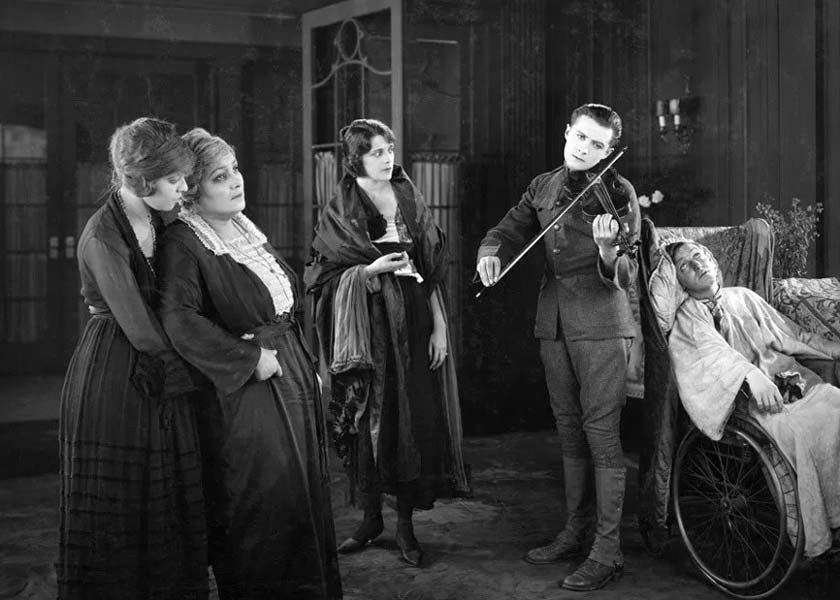Synopsis
The Kantor Family live in the Jewish ghetto of New York City. On his ninth birthday, Leon Kantor (Connelly) wants the fiddle he has seen in a toy store window. His father, Abraham (Davidson) refuses, but Mama (Gordon) knows her prayers have been answered; one of her six children will be a musician. She gives Leon the broken fiddle his older brother Izzy (Joseph Cooper) did not want. Leon immediately plays some plaintive notes.
As the years pass, Leon (Glass) develops into a virtuoso. He plays a Stradivarius
violin to large and appreciative audiences in America and Europe. Leon’s earnings
have enriched his entire family who have moved from the ghetto to a fine apartment
on Fifth Avenue. Mama is very proud of her wonder boy
who has achieved fame
and provided them with so much. Before each concert, Leon's mother must pet her
boy and calm his agitation. Audiences are particularly responsive to his fervid
playing of Dvorak's Humoresque. Mama says the piece cries to hide its
laughter and laughs to hide its crying. The day Leon signs a large contract with a
leading impresario, World War I begins in Europe. In Europe, he renews his
acquaintance with a childhood playmate, Gina Berg (Rubens), formerly Minnie
Ginsberg, who has been studying on the continent.
In 1917, with two of his brothers already in the army, Leon signs up. Before going
overseas, he says farewell to his family, all of whom unsuccessfully try to hide
their sorrow and fear. Mama, in particular, laments that her
wonder boy
must go. Leon soothes them. Gina visits to say goodbye; she and
Leon pledge to meet in spring. Gina asks Leon to play a new piece, and she will
sing. The first line is I have a rendezvous with death.
Months later, Leon has returned wounded from the war. He cannot lift his immobilized right arm. Despondent, Leon refuses to move from his chair. He tells Gina to leave him because he is a cripple. She goes outside the glass door, says she cannot stand a separation, drinks some liquid from a bottle, and collapses. Leon rushes to her, and with no one around to help him, lifts her and carries her to his mother in the next room. Gina is quickly revived; she did not drink any dangerous substance, but only wanted to stimulate Leon into motion. His fear for her has enabled him to move his arm. He picks up his violin and begins to play. Gina embraces him. His family are happy and grateful for his recovery.
Discussion
Based on a short story by Fannie Hurst, Humoresque was extremely popular when it was released and played extended engagements all over the US. Audiences and critics were particularly impressed with the performance of Vera Gordon as Mama Kantor. Until the ending scene, the film shares with the story the same plot basis, the intense love of a Jewish mother for her artistically successful son and the intense pain and foreboding she feels on his becoming a soldier and leaving for war. Dvorak's Humoresque, the music hiding pain amid laughter, symbolizes Mama hiding her pain under smiles. The film undercuts the plot’s focus on Mama's feelings by adding the happy ending focusing on the relationship between Leon and Gina.
Mama Kantor fits within the stereotype of the intensely loving and overprotective Jewish mother who has great aspirations for at least one of her children. Although Vera Gordon's striking performance made her a star, to the modern viewer the character comes off as intrusive and smothering. Leon Kantor is a colorless character overpowered by his dominating mother, and Gaston Glass, playing the adult age son, displays little personality. Alma Rubens has a small role. She first appears near the middle of the film and has her longest screen time during the final scene in the hospital.
Frank Borzage, an important director of both silents and talkies, began his career around 1912 as an actor and began directing in 1915. Borzage's best known silent is 7th Heaven (1927), one of the biggest hits of its time, for which he received the first ever Academy Award for Best Director. His career continued successfully into the sound era. He won his second Academy Award for Best Director for Bad Girl (1931). His other notable films include Street Angel (1928), No Greater Glory (1934), The Mortal Storm (1940), and His Butler's Sister (1943). His final credited film was The Big Fisherman (1959), starring Howard Keel as Simon Peter.
The music around which the film revolves, the poco lento e grazioso from
Antonin Dvorak's piano cycle Humoresques, is a nice tune but lacks
the intensity needed to induce feelings of pain and laughter. The
poco lento is the most popular of the pieces and arrangements of the music
have been produced for many instruments, including the violin. As a musical genre,
humoresque
refers to music with a light and humorous mood.
Unfortunately, the appeal of the film Humoresque has not withstood the test of time. To a modern viewer, it is slow moving, dull, and mawkish.
Further Reading

